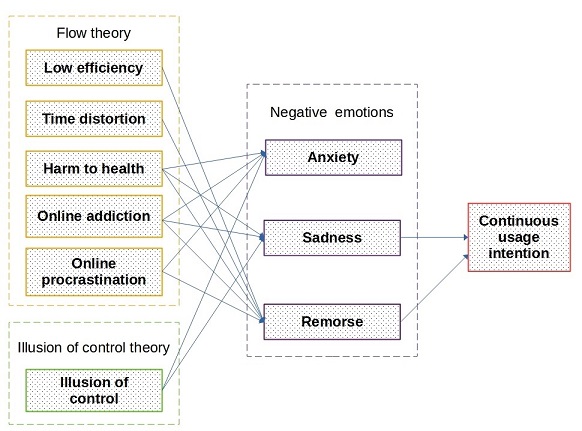Short videos are very popular but if they take up a-lot of people’s time, they gradually change people’s living habits. Therefore it is useful to understand the negative implications of short videos. The results show that users’ viewing many short videos can have negative emotions, and these negative emotions can affect users’ intention to continue to use short video platforms. The model developed in this research shows that there are three negative emotions caused by six factors. Two of these three negative emotions then influence the intention to continue using short videos.

From the six factors that cause negative emotions, the five are related to flow theory. Flow theory is relevant here because watching short videos is a flow experience. Flow theory is a state where someone is fully immersed in an activity, they are enjoying it and other things do not seem to matter as much.
The first of the five factors related to flow theory is the low efficiency the user has in their work and other tasks, due to watching short videos. The second is time distortion, meaning that the users perception of time is not as accurate during this activity. What might feel like a short amount of time can be much longer. The third is the harm to their health. Both mental and physical health can be harmed by spending a long time watching short videos. The fourth is the online addiction they experience, making them want to keep watching the short videos. The fifth is online procrastination, making the user watch more short videos to delay working and making decisions related to their work.
The sixth factor that can cause negative emotions is illusion of control. The theory of illusion of control suggests that in some situations a person can be overconfident about their control of a situation. A person can have a level of optimism that they will get the outcome they want, that is unrealistic. The negative emotions include anxiety, sadness and remorse. The research found strong support that sadness and remorse influence the users intention to continue using the short videos.
Reference:
Cheng X., Su X., Yang B., Zarifis A. & Mou J. (2023) ‘Understanding users’ negative emotions and continuous usage intention in short video platforms’, Electronic Commerce Research and Applications, vol.58, 101244, pp.1-15. https://doi.org/10.1016/j.elerap.2023.101244